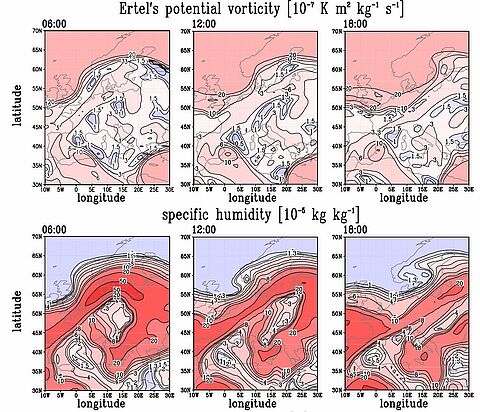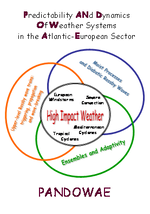VARNAER
Variability and extremes of poleward breaking Rossby waves over the North Atlantic-European region
DFG research proposal
Applied physics, Dynamic Meteorology
Requested funding: 3 years
Requested founding for two PhD students (TVL E13/2)
Justification: The overall project goal could be separated naturally into two self-contained contributions for each PhD student to receive independent project parts. Both, part A and part B which differ in the methodology, are needed because only in combination the overall aims will be reached.
Conditions and skills of students necessary for a realization of project goals in the short time schedule of 3 years:
- Expertise of atmospheric physics and meteorology: knowledge of the theory of atmospheric circulation, wave propagating processes, ability to develop concepts to resolve open scientific questions
- Experience in modeling: knowledge of the model basics including parameterizations, design and setup of model runs (optimal resolution, parameter choice, data assimilation) management of analysis products,
- Strong background in statistics: joint analysis of big data sets of different quality in order to find out relevant patterns and physical quantities
Summary
In the extratropics Rossby waves play an important role in determining the general circulation, especially in the upper troposphere / lower stratosphere region. It is known that events of poleward breaking Rossby waves are often observed over the North Atlantic-European region in wintertime. In this project we investigate the influence of the observed background flow in the upper troposphere on poleward Rossby wave breaking events and the link to severe weather. We will study the seasonal cycle and interannual variability of events of poleward breaking Rossby waves over the North Atlantic-European region and diagnose the extreme cases of the wave breaking events for each season, based on ECMWF Reanalysis (ERA-40) and analyses. The predictability of such events is investigated by using different forecasts data sets. Furthermore, the expected influence of the different zonally varying background flows on poleward Rossby wave breaking will be examined in simplified global ECHAM5 model simulations in order to improve the understanding of this process. A further key investigation is the diagnosis and mesoscale modelling (MM5) for implications of poleward Rossby wave breaking events on the change of the Grosswetterlage (large scale flow) in the lower troposphere, in order to examine different acting mechanisms, and to understand the seasonal differences of the influence and of the impact on severe weather over Northern Europe.
Zusammenfassung
In den Extratropen spielen Rossbywellen eine wichtige Rolle in der Bestimmung der Allgemeinen Zirkulation, im besonderen in der oberen Troposphäre / unteren Stratosphäre. Wir wissen, dass Ereignisse mit polwärts brechenden Rossbywellen oft über der Nordatlantik-Europa Region im Winter beobachtet werden. In diesem Projekt untersuchen wir den Einfluss der beobachteten Hintergrundströmung in der oberen Troposphäre auf Ereignisse von polwärts brechenden Rossbywellen und die Verbindung zu schwerem Wetter. Wir studieren die saisonale und interannuale Variabilität der Ereignisse von polwärts brechenden Rossbywellen über der Nordatlantik-Europa Region und diagnostizieren die extremen Fälle von polwärts brechenden Rossbywellen für jede Saison, basierend auf EZMW Reanalysen (ERA-40) und Analysen. Die Vorhersagbarkeit von solchen Ereignissen wird durch die Verwendung unterschiedlicher Vorhersagedatensätze untersucht. Weiterhin wird der erwartete Einfluss der unterschiedlichen zonal variierenden Hindergrundströme auf das polwärtige Rossby Wellenbrechen mit vereinfachten globalen ECHAM5 Modelsimulationen überprüft, um das Verstehen dieses Prozesses zu verbessern. Ein weitere wichtige Untersuchung bildet die Diagnose und mesoskalige Modellierung (MM5) von Auswirkungen der Ereignisse von polwärts brechenden Rossbywellen auf die Änderung der Großwetterlage in der unteren Troposphäre, um die unterschiedlich wirkenden Mechanismen zu überprüfen, und die saisonalen Unterschiede der Wirkung und der Auswirkung auf schweres Wetter über Nordeuropa zu verstehen.
Results


Privatdozent Dr. habil. Dieter H.W. Peters
Tel. : +49 (0) 38293 68 380
Fax : +49 (0) 38293 68 50

Navigation
- Research interests
- Research projects
- LEWIZ- Projects
- SORACAL (CAWSES)
- VARNAER (PANDOWAE)
- Course
- Publications
- Homepage













